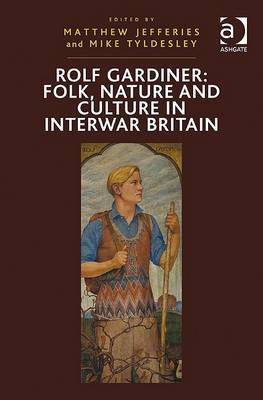
Bedankt voor het vertrouwen het afgelopen jaar! Om jou te bedanken bieden we GRATIS verzending (in België) aan op alles gedurende de hele maand januari.
- Afhalen na 1 uur in een winkel met voorraad
- In januari gratis thuislevering in België
- Ruim aanbod met 7 miljoen producten
Bedankt voor het vertrouwen het afgelopen jaar! Om jou te bedanken bieden we GRATIS verzending (in België) aan op alles gedurende de hele maand januari.
- Afhalen na 1 uur in een winkel met voorraad
- In januari gratis thuislevering in België
- Ruim aanbod met 7 miljoen producten
Zoeken
€ 305,45
+ 610 punten
Omschrijving
Folk dancer, forester, poet and visionary, Rolf Gardiner (1902-71) is both a compelling and troubling figure in the history of twentieth-century Britain. While he is celebrated as a pioneer of organic farming and co-founder of the Soil Association, Gardiner's organicist outlook was not confined to agriculture alone. Convinced that a healthy culture and society could only flourish when it was rooted in the soil, Gardiner sought national regeneration too. One of the most colourful and controversial figures of the interwar period, Gardiner believed Britain's future lay not with its doomed empire, but in ever closer union with its 'kin folk, kin tongued' neighbours in Germany, the Netherlands and Scandinavia. Fascinated by the Weimar Republic's myriad youth leagues and life reform movements, Gardiner became an important conduit between North Sea and Baltic. Yet while an enthusiasm for hiking, nudism, folk dancing and voluntary labour camps must have appeared harmlessly eccentric to many in 1920s Britain, by the late-1930s Gardiner's continued engagement with Germany was to have altogether darker connotations. This volume, which brings together seven scholars currently working on different aspects of Gardiner's life and work, eschews a straightforwardly biographical approach and instead focuses on the decades when he was at his most dynamic and radical. Situating Gardiner within the wider political and cultural contexts of the interwar years and exploring youth culture, the origins of the organic movement, Anglo-German relations and British cultural history, it is an essential addition to modern history libraries.
Specificaties
Betrokkenen
- Auteur(s):
- Uitgeverij:
Inhoud
- Aantal bladzijden:
- 202
- Taal:
- Engels
Eigenschappen
- Productcode (EAN):
- 9781409412045
- Verschijningsdatum:
- 23/12/2010
- Uitvoering:
- Hardcover
- Formaat:
- Genaaid
- Afmetingen:
- 156 mm x 234 mm
- Gewicht:
- 462 g

Alleen bij Standaard Boekhandel
+ 610 punten op je klantenkaart van Standaard Boekhandel
Beoordelingen
We publiceren alleen reviews die voldoen aan de voorwaarden voor reviews. Bekijk onze voorwaarden voor reviews.









